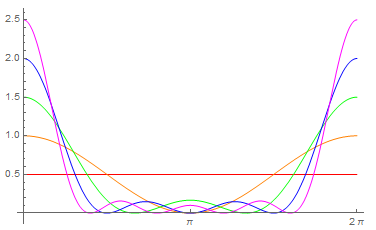In the question When are Fourier coefficients monotonic it was determined that, if a function $f$ is (the restriction to $[0,2\pi]$) of a completely monotone function, then its Fourier coefficients, defined as $$ \hat{f}(n) := \int_{0}^{2\pi}f(x)\cos(nx) dx, \quad n = 1,2,\ldots, $$ are monotonically decreasing (decreasing due to the decay of Fourier coefficients).
An interesting extension to this result would be, what further conditions on $f$ would be sufficient for $\hat{f}$ to be convex, i.e. in the sense that $$ \hat{f}(n+1) + \hat{f}(n-1) - 2\hat{f}(n) \geq 0 \quad \text{for } n \geq 1. $$
Note: Such a function does exist, since it is known that if there is a convex sequence of numbers $(a_n)_{n\in\mathbb{N}}$, in the above sense, that tends to zero, then there exists an $f \in L^1(\mathbb{T})$ with $f \geq 0$ such that $\hat{f}(n) = a_n$. See Lemma 1.12 of Classical and Multilinear Harmonic Analysis by C.Muscalu and W. Schlag, page 16.

